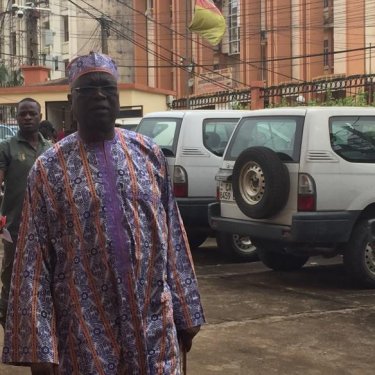Cameroonian court refuses to free journalist needing treatment

Reporters Without Borders (RSF) is appalled by today’s Yaoundé Special Criminal Court decision to reject a request for Amadou Vamoulké’s provisional release although two medical reports say this journalist needs treatment abroad and his continuing detention violates Cameroonian law. It was like a preliminary conviction, RSF said.
Neither moral nor legal arguments swayed the court, which ruled at today’s hearing, the 25th in Vamoulké’s trial, that the request by his lawyers for his release had “no basis.”
In so doing, the judges accepted the attorney-general’s argument, presented at last week’s hearing, that Vamoulké could not avail himself of the Cameroonian criminal code’s “benevolent provisions” for provisional release because his crime is punishable by life imprisonment. Vamoulké, who has already spent three years and three months in provisional detention, is being tried on a charge of misusing state funds – not for personal ends but with the sole aim of benefitting CRTV, the state radio and TV broadcaster he ran from 2005 to 2016. Nonetheless, one of Vamoulké’s co defendants has already been granted a provisional release, the criminal code says no one may be detained provisionally for more than 18 months, and the law creating the Special Criminal Court says it must complete its trials within nine months.
“Today’s ruling is like an initial conviction,” said Arnaud Froger, the head of RSF’s Africa desk. “Keeping this journalist in prison and continuing to deny him the treatment and tests he needs is tantamount to persecution and torture. This decision defies common sense, the law, morality and human dignity. It confirms – if any confirmation were needed – the political nature of these proceedings, which have dragged on for three and a half years.”
The next hearing, the 26th since the start of the trial, has been set for 7 January.
When RSF visited Vamoulké in Yaoundé’s Kondengui prison on 19 November, it saw that he has not received any treatment since September, when he was diagnosed by two neurologists as suffering from neuropathy in medical reports that were given to the court. RSF enclosed copies of the reports when it used an emergency procedure to refer Valmouké’s case to the UN Working Group on Arbitrary Detention, and to the UN special rapporteur on torture and other cruel, inhuman or degrading treatment or punishment.
Cameroon is ranked 131st out of 180 countries in RSF’s 2019 World Press Freedom Index.



